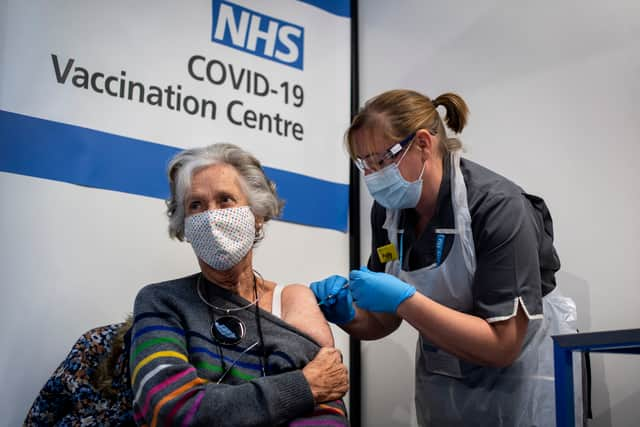Covid booster jab: Autumn vaccine eligibility explained, who can get a booster - ages and health conditions
and live on Freeview channel 276
The number of people who will be eligible to receive the Covid-19 booster jab in the autumn has been reduced, health officials have announced.
Following advice on the UK booster programmes from the Joint Committee on Vaccination and Immunisation (JCVI), the vaccine will only be provided to those who are 65 years of age and older, as well as health and care workers and people with specific health conditions.
Advertisement
Hide AdAdvertisement
Hide AdWho is eligible?


The Covid-19 jab is not available privately in the UK, so those who were offered the vaccine last year and are not eligible this year will not be able to purchase the jab themselves.
Those eligible for a vaccine on this year’s autumn booster programme include:
- Adults aged 65 and over
- Care home residents
- Those aged six months and older who are deemed to be “clinically at risk” with illnesses including severe asthma, diabetes and a number of chronic illnesses
- People who are immunosuppressed – either through illness or treatment for cancer – and their household contacts aged 12 and over
- Those aged over 16 who are carers
Meanwhile the JCVI said adults who are yet to receive a Covid vaccine will be eligible to get a single jab during the booster campaign.
Professor Wei Shen Lim, chairman of Covid-19 immunisation on the JCVI, said: “The autumn booster programme will continue to focus on those at greatest risk of getting seriously ill.
Advertisement
Hide AdAdvertisement
Hide Ad“It is important that everyone who is eligible takes up a booster this autumn – helping to prevent them from hospitalisations and deaths arising from the virus over the winter months.”
When will the booster be offered?
The JCVI also advised that the NHS should deliver the programme by early December to “optimise protection” over the winter months.
The JCVI sets out its recommendations on vaccinations for the whole of the UK, and then it is up to each of the devolved nations to decide on whether or not to take up the recommendations.
Health Secretary Steve Barclay said he had accepted the JCVI advice for the booster programme in England, adding: “NHS England will confirm details on how and when eligible people can access the autumn booster vaccine shortly, and I would urge anyone invited – including those yet to have their first jab – to come forward as soon as possible.”
Advertisement
Hide AdAdvertisement
Hide AdDr Mary Ramsay, director of public health programmes at UKHSA, said: “The Covid-19 virus has not gone away and we expect to see it circulating more widely over the winter months, with the numbers of people getting ill increasing.
“The booster is being offered to those at higher risk of severe illness and by taking up the booster vaccine this autumn – you will increase your protection ahead of winter, when respiratory viruses are typically at their peak.”
Why has eligibility been reduced?
The autumn booster vaccine was provided to those 50 and older last year, but this year's eligibility requirements have been tightened, and only those 65 and older will be offered the jab.
Health officials said that the larger group was offered the booster jab last year as part of the “emergency response” to the pandemic.
Advertisement
Hide AdAdvertisement
Hide AdBut the “success of these programmes has enabled us to live with Covid and, this year, we are able to scale back the number of people who require an autumn booster”, officials said.
Health officials previously announced they would also be scaling back eligibility for the flu jab this year. During the height of the pandemic, over-50s were offered the jab in a bid to reduce co-circulation of flu and Covid and relieve pressure on the NHS.
Comment Guidelines
National World encourages reader discussion on our stories. User feedback, insights and back-and-forth exchanges add a rich layer of context to reporting. Please review our Community Guidelines before commenting.
